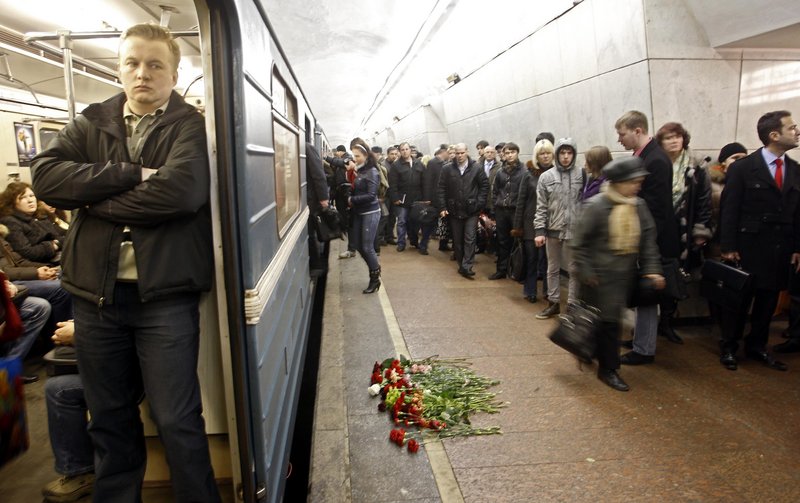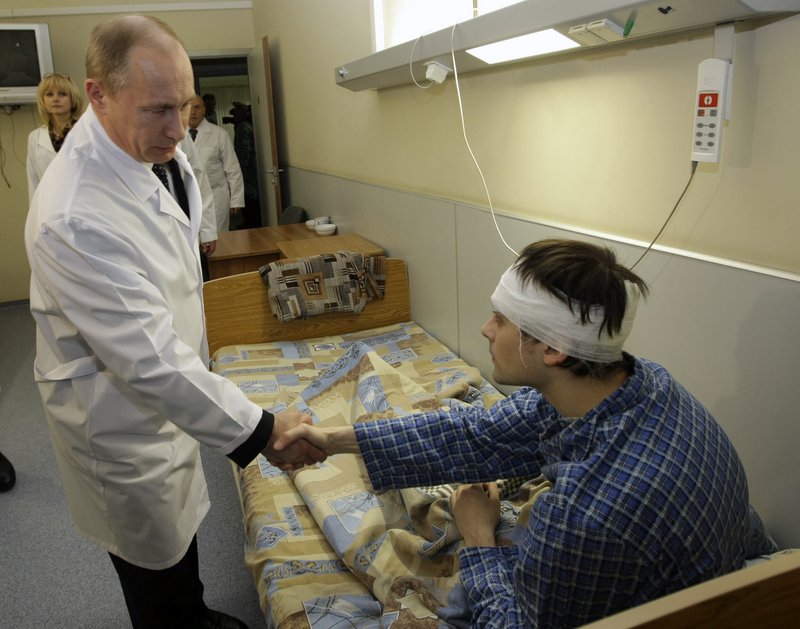MOSCOW – Terror returned to the heart of Russia on Monday with two suicide bombings on the Moscow subway at rush hour, including an attack at the station beneath the headquarters of the secret police.
At least 38 people were killed and more than 60 wounded in the morning explosions, the first such attacks in Moscow in six years.
Russian police have killed several Islamic militant leaders in the North Caucasus recently, including one last week in the Kabardino-Balkariya region, which raised fears of retaliatory strikes and escalating bloodshed by the militants.
As smoke billowed through the subway tunnels not far from the Kremlin and dazed survivors streamed out of the vast transportation system, al-Qaida-affiliated Web sites were abuzz with celebration of the attacks by the two female suicide bombers.
The bombings showed that the beleaguered rebels are still strong enough to inflict harm on an increasingly assertive Russia, and they followed a warning last month from Chechen rebel leader Doku Umarov that “the war is coming to their cities.”
Prime Minister Vladimir Putin, who built much of his political capital by directing a fierce war against Chechen separatists a decade ago, promised to track down and kill the organizers of what he called a “disgusting” crime.
“The terrorists will be destroyed,” he said on national television.
In a televised meeting with President Dmitry Medvedev, Federal Security Service head Alexander Bortnikov said the remains of the two bombers pointed to a Caucasus connection.
“We will continue the fight against terrorism unswervingly and to the end,” Medvedev said.
Umarov, the Chechen rebel leader, has relied on al-Qaida’s financial support and has several al-Qaida emissaries in his entourage, said Alexander Ignatenko, the head of the independent Moscow-based Institute for Religion and Politics, who has closely followed the Islamic insurgency in the Caucasus.
“Al-Qaida has established a presence in the North Caucasus, like they did in Afghanistan, Pakistan, Iraq, Somalia and Europe,” Ignatenko told The Associated Press. The militants’ links with al-Qaida also are recognized by other experts on terrorism.
Militants in the Caucasus have declared the creation of an Islamic state as their top goal. Radical Islamic sects have spread throughout the Caucasus region and parts of Russia as well, with religious schools set up. In Chechnya, Kremlin-backed strongman Ramzan Kadyrov has conducted a campaign to impose Islamic values in an effort to blunt the appeal of hard-line Islamic separatists.
Monday’s first explosion took place just before 8 a.m. at the Lubyanka station in central Moscow, beneath the notorious headquarters of the Federal Security Service, or FSB, the KGB’s main successor agency. The FSB is a symbol of power under Putin, a former KGB officer who headed the agency before his election as president in 2000.
About 45 minutes later, a second blast hit the Park Kultury station on the same subway line, which is near renowned Gorky Park.
In both cases, the bombs were detonated as the trains pulled into the stations and the doors were opening.
“I was getting off the train when I heard the sound of an explosion and saw clouds of smoke,” said Yegor Barbatunov, 29.
“The (Park Kultury) station was jammed with people trying to get out, but there was no panic. I saw a young man walking past, blood pouring off his head and neck and trickling to the floor.”
Added Alevtina Rogatova, a 23-year-old student who was on the same train: “I smelled burning plastic and heard cries of ‘let the wounded through.’“
Amateur video on Russian TV showed wounded and possibly dead commuters on the floor of the smoke-filled Lubyanka station.
One video showed gruesome images of dead passengers sprawled inside a mangled subway car and a bloody leg lying on a station platform.
Passengers streamed out of the stations, many crying and making frantic calls on cell phones.
The wounded were put on ambulances and helicopters, some with their heads wrapped in bloody bandages, as sirens wailed.
Traffic was paralyzed as large sections of downtown were closed off.
Some cab drivers jacked up their rates for panicky passengers trying to get to work, drawing a harsh rebuke from Orthodox Patriarch Kirill later in the day.
“Any desire to profit on the grief of others brings nothing but grief in return,” he said after a liturgy.
Copy the Story Link
Send questions/comments to the editors.




Success. Please wait for the page to reload. If the page does not reload within 5 seconds, please refresh the page.
Enter your email and password to access comments.
Hi, to comment on stories you must . This profile is in addition to your subscription and website login.
Already have a commenting profile? .
Invalid username/password.
Please check your email to confirm and complete your registration.
Only subscribers are eligible to post comments. Please subscribe or login first for digital access. Here’s why.
Use the form below to reset your password. When you've submitted your account email, we will send an email with a reset code.